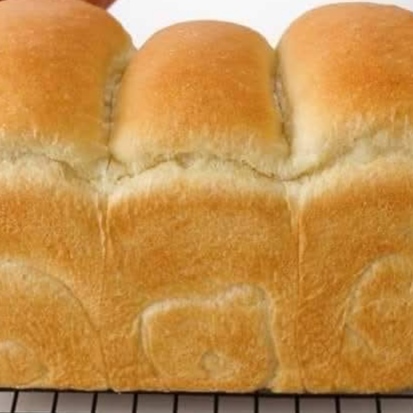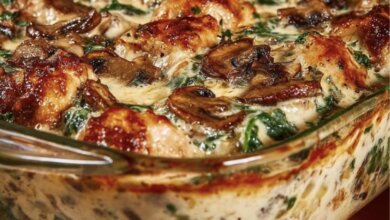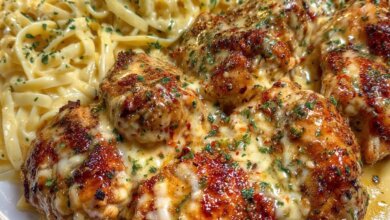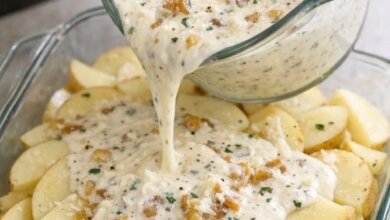Easy No-Knead Bread Recipe

Recipe for Easy-to-Make Bread Without Kneading
Ingredients:
- Water: 200 milliliters (equivalent to 0.85 cups)
- Sugar: 25 grams (2 tablespoons)
- Yeast: 3 grams (1 teaspoon)
- Flour for making bread: 300g (2 cups)
- Salt: 3 grams (1/2 teaspoon)
- Olive Oil: 20 grams (2 tablespoons)
Size of the mold: For a 450g loaf, use a mold that is 20.8 centimeters long, 11.8 centimeters wide, and 11 centimeters tall.
Baking Temperature and Time:
Cook in the oven at 170°C (340°F) for around 25-30 minutes.
PREPARATION:
Make the liquid mixture:
In a big bowl, mix together 200 ml (0.85 cup) of water, 25 grams (2 tablespoons) of sugar, and 3 grams (1 teaspoon) of yeast. Stir thoroughly to make the sugar and yeast dissolve.
Combine the dry ingredients and mix to form the dough:
Slowly mix in 300 grams (2 cups) of bread or wheat flour and 3 grams (1/2 teaspoon) of salt into the wet mixture. Mix until you have a dough.
Mix in the olive oil:
Add 20 grams (2 tablespoons) of olive oil to the dough. Use a spatula to mix the oil into the dough until it is well combined.
Beginning Rest:
Place a clean kitchen towel or plastic wrap over the bowl and allow the dough to rest for around 20 minutes.
Knead the dough once more:
After 20 minutes, stir the dough once more until it is smooth. This will help the dough rise without having to knead it.
First Proofreading:
Cover the dough and leave it in a warm spot for around 1 hour, or until it doubles in size.
Get the dough ready for shaping:
Put some flour on a clean surface, such as a silicone baking mat, to avoid sticking. Move the dough to the mat. Put more flour on the dough to avoid it sticking, then press down on the dough to remove air and flatten it.
Make a crease in the dough:
Fold the dough in half four times and then form it into a round ball.
Separate and Mold:
Separate the dough into 3 equal parts. Shape the dough into a tight ball by cupping your hands around it and rotating it on the surface.
Let the dough rest:
Place a towel over the dough balls and allow them to sit for around 15 minutes.
Form each part to fit the mold:
Take each portion of dough, press it down softly, and shape it into a long strip.
Flip the dough, fold the sides in, and use a rolling pin to make it longer:
Flip it, flatten one side, and roll it from the thicker end. Squeeze the end tightly to close it.
Get ready for the second round of checking:
Put each piece of dough into the mold that measures 20.8×11.8×11 cm and can hold 450g. Do the same with the rest of the dough pieces.
Second Proofreading:
Place a cloth over the dough and let it rise in a warm spot for around 50 minutes, or until it fills up 80% to 90% of the mold.
Make the bread:
Heat your oven to 170°C (340°F) before using it. Cook the dough that has expanded for approximately 25-30 minutes or until it turns a golden brown color on the surface.
Chill and Serve:
Take the bread out of the oven and allow it to cool in the pan for a few minutes before moving it to a cooling rack to cool down completely. Cut and savor some freshly baked, tender homemade bread.
Key Advice:
Replace Olive Oil: You can use different types of cooking oil like sunflower oil, vegetable oil, or canola oil instead of olive oil, depending on what you like.
Change the time and temperature for baking: Each oven is different, so make sure to adapt the baking temperature and time based on your oven and the size of the baking mold. Keep an eye on the bread as it finishes baking to avoid burning it.
Ways to serve food:
This bread is delicious by itself or can be sliced for sandwiches, toast, or breakfast with toppings such as butter, jam, or avocado.
Tips for storing items:
Room Temperature: Keep the bread in a closed bag or container at room temperature for a maximum of 3 days.
Freezing bread: Wrap it in plastic wrap and put it in a bag that can go in the freezer. It will stay good for up to 3 months. Defrost and warm up when necessary.
Reasons to Enjoy This Dish:
- No need to knead: Very simple with little effort.
- No eggs or butter: Ideal for people with dietary limitations.
- Soft and Fluffy: The bread is ideal for making sandwiches or toast.
- Affordable: Uses simple ingredients found in the pantry.
Final thought:
This bread recipe is great for anyone who wants to make homemade bread that is simple and inexpensive. With its smooth feel and delicious taste, you won’t ever feel like purchasing bread again. Give it a go and savor the wonderful smell of freshly baked bread spreading through your kitchen!
Commonly Asked Questions:
Can I substitute whole wheat flour for bread flour? Yes, but it might feel thicker. You may need to put more water in the dough to account for the extra liquid it absorbs.
What alternatives can I use in place of sugar? You can use honey, maple syrup, or any sweetener you like. However, it might change how the dough feels and how much it grows.
Can I prepare this bread without gluten? Yes, you can use flour without gluten, but the texture will be different. Make sure the gluten-free flour mix includes a substance that helps hold it together, such as xanthan gum.
Why is the second rising of the dough necessary? The second time the dough rises helps it get more flavor and a better texture, resulting in softer bread.
How can I store bread to make it last longer? Keep it in a sealed container at room temperature. If you live in a damp place, think about putting it in the fridge.
Can I include herbs or seeds in this bread? Yes! Include your preferred herbs, seeds, or nuts in the dough to give it more taste and crunch.
How can I tell when the bread is ready to be taken out of the oven? Tap the bottom of the bread; it should make a hollow sound. You can also use a thermometer to check the inside temperature, which should be about 93°C (200°F).
Can I use instant yeast instead of dry active yeast? Sure, but decrease the amount to around 2 grams (3/4 tsp).
Can I use a different pan to bake this bread? Of course! Change the baking time based on the size and shape of the pan you are using.



